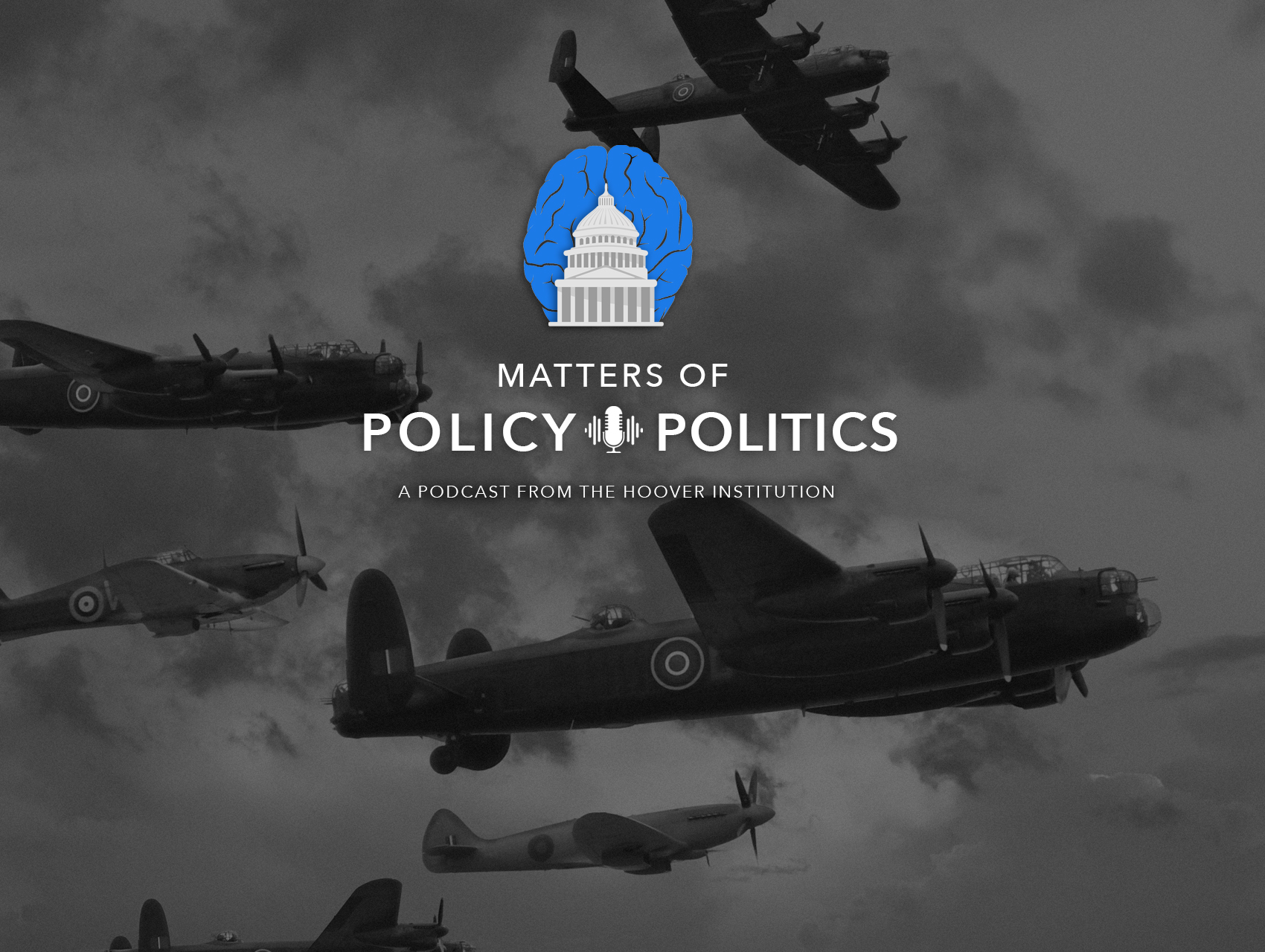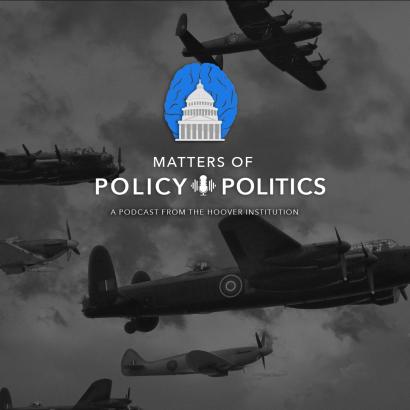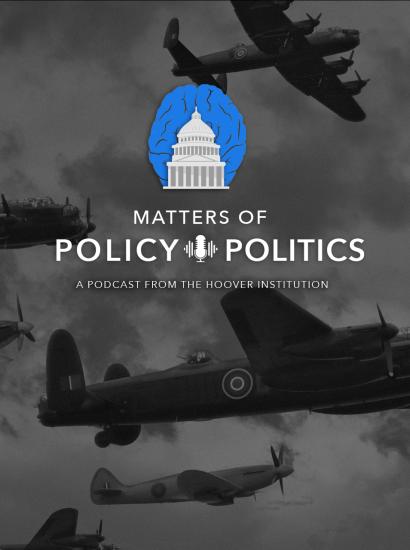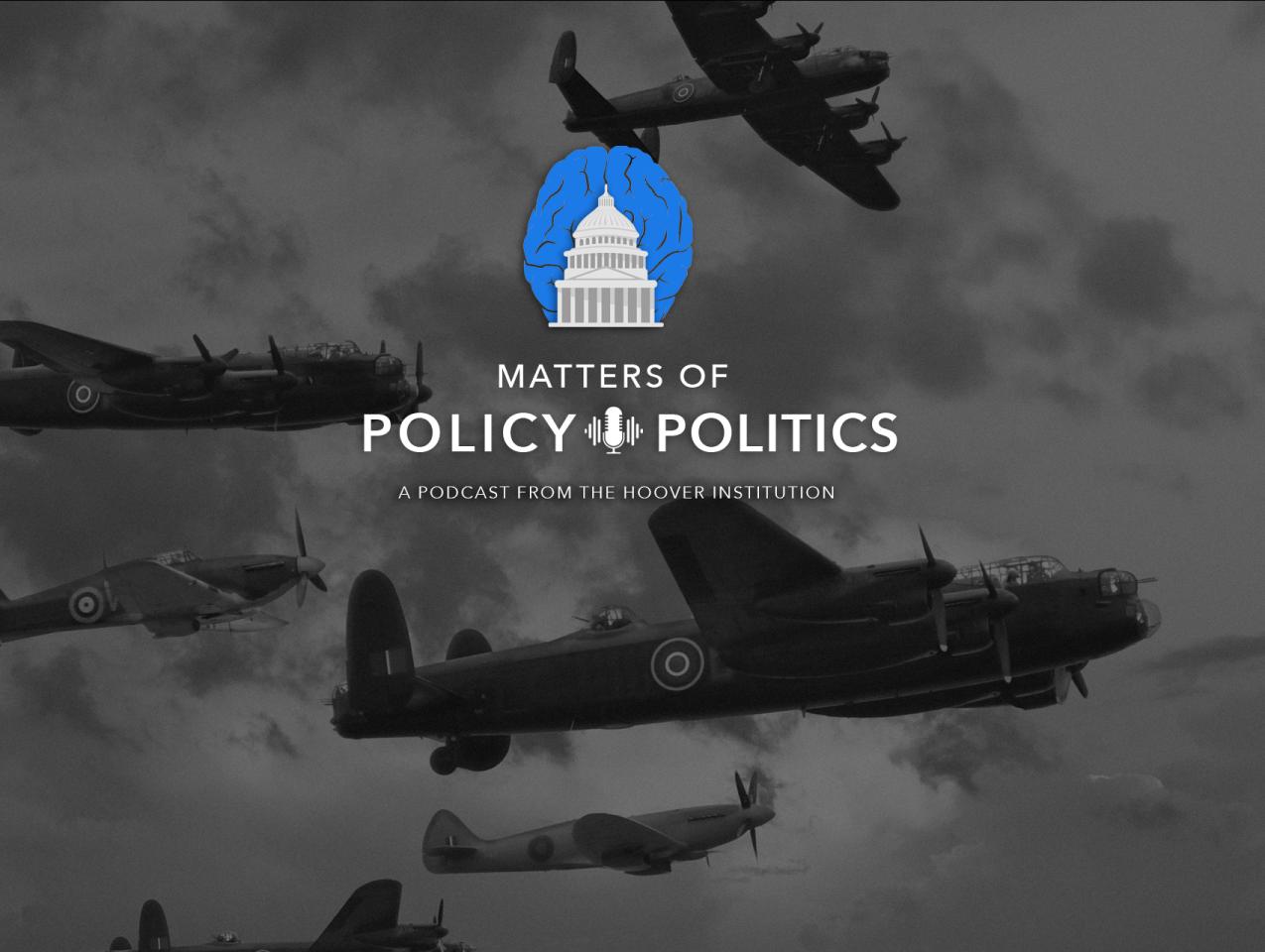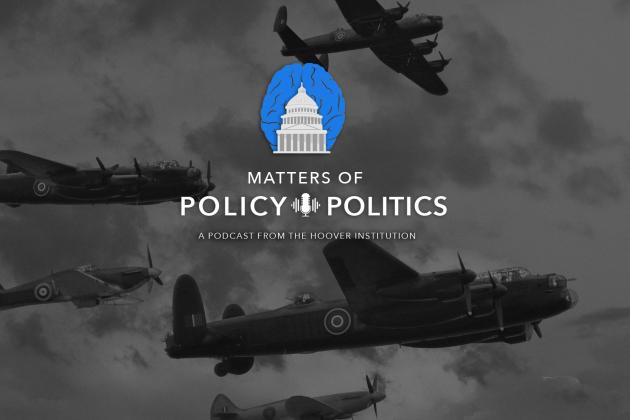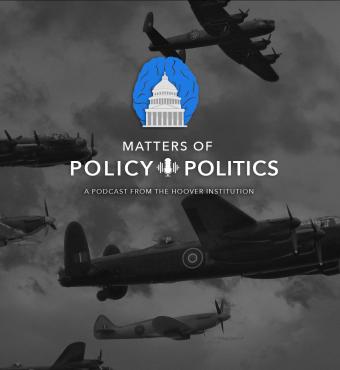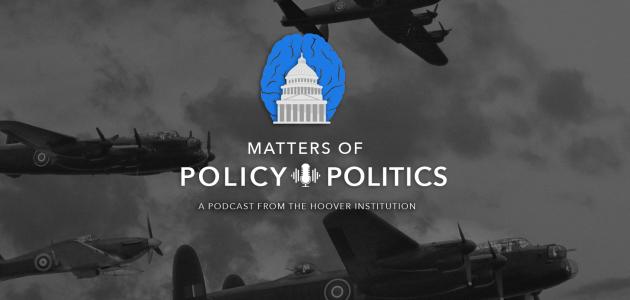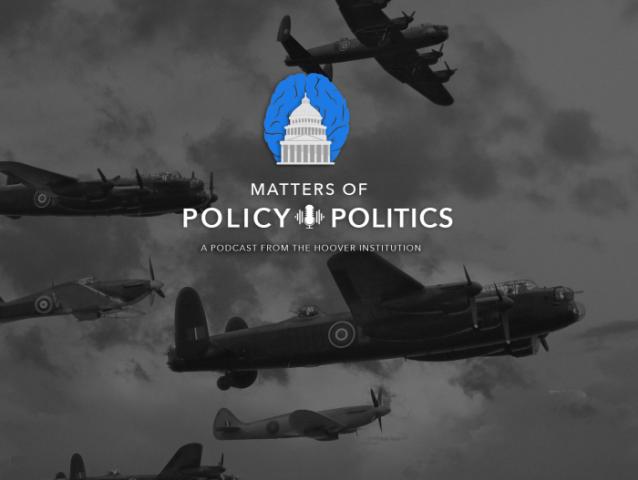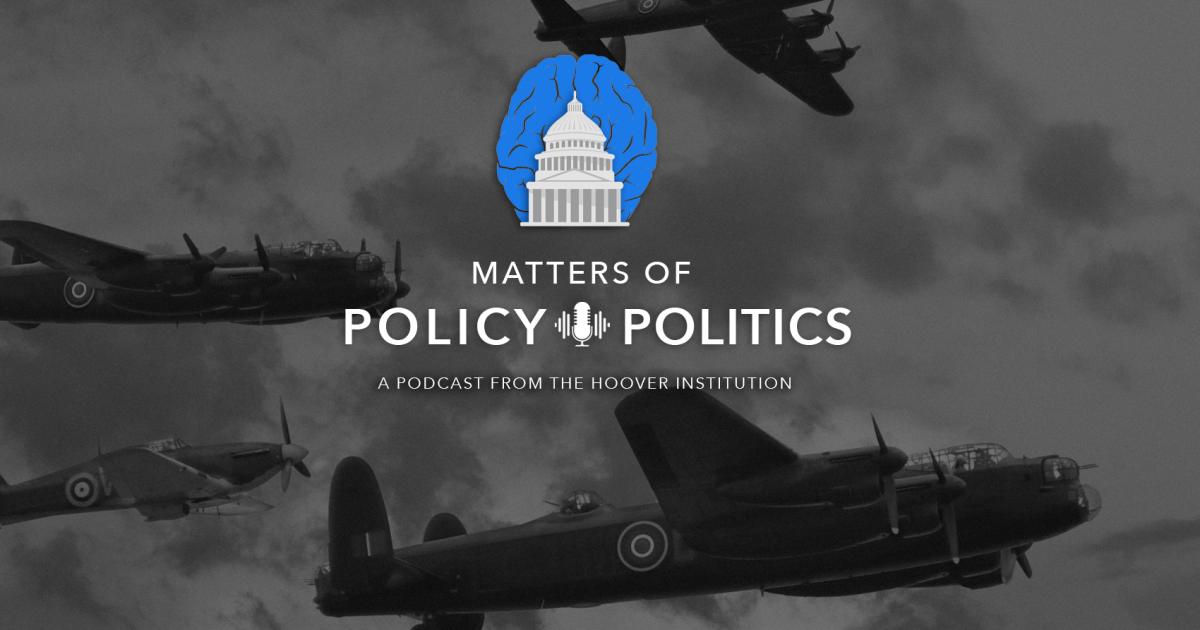A look back at wartime moral dilemmas confronting America’s “greatest generation” – dropping atomic bombs, interning Japanese-Americans, whether to starve Axis populations – all raise questions concerning how present-day leaders will confront crises. Zachary Shore, a Hoover Institution national security fellow and Naval Postgraduate School professor, discusses lessons learned from World War II and the fine art of understanding enemies especially when dealing with the likes of Vladimir Putin and Xi Jinping.
>> Bill Whalen: It's Thursday, February 9, 2023, and welcome back to Matters of Policy and politics, a Hoover Institution podcast devoted to governance and balance of power here in America and around the globe. I'm Bill Whalen, I'm the Hoover Institution's Virginia Hobbs Carpenter Distinguished Policy Fellow in Journalism. Before I go any further, I'd like to thank those of you who've written to me in the past few weeks and said, hey, where are all the podcasts?
And the truth is, I've been dealing with limited bandwidth, friends. I developed an illness over the holidays, which was a lung infection. And if you had the same thing, you know what this is all about. It's a cough, it's a lot of congestion. And you listen to these podcasts to benefit from the collective wisdom of Hoover's fellowship, not to listen to me wheeze and cough.
So I've been trying to stay away from the microphone, but I feel much healthy, and so back in the podcasting business. Besides, I could take a break because the Hoover Institution already has a pretty impressive phalanx of fellows who are doing podcasts. If you're not familiar with the work of the Hoover Institution, you should check it out.
Go to our website, which is hoover.org. Click on the tab at the top of the page, it says Commentary. Then go over to where it says Multimedia, up will pop the podcasts. You can subscribe to any, all if you want to. You can also sign up for our monthly pod blast, which delivers the best of our podcasts to your inbox, each and every month.
My guest today is Zachary Shore. Zachary Shore is a Hoover Institution national security visiting fellow and a professor of national security affairs at the Naval Postgraduate School in Monterey, California. You can hear the sound of envy in my voice. Monterey is God's country in my estimation. Zach's a historian of international conflict with a focus on understanding the enemy.
I asked Zach to come on the podcast today to discuss what's happening on the world stage. But also to tie it into a very excellent book that he wrote called This Is Not Who We Are: America’s Struggle Between Vengeance and Virtue. It revisits some of the more morally complicated matters of World War II and America's so-called greatest generation.
Zach, thanks for coming on the podcast today.
>> Zachary Shore: Hey, Bill, it's great to be with you, and I'm really glad you're feeling better.
>> Bill Whalen: Thank you very much. And I know you've been dealing with throat issues as well, so. But in your case, you're just in too much demand, right?
>> Zachary Shore: An occupational hazard.
>> Bill Whalen: Yeah, well, it's tough to be popular and be smart, my friend. Before we get into the book and what's going on on the world stage, Zach, let's talk a little bit about Zachary Shore, I'm always curious to how people end up in their lines of work.
Zach, what was it about history that intrigued you, and what is about international conflict that you decided to single out as a pursuit?
>> Zachary Shore: A lot of people think that we study war because we're infatuated with it. When the opposite, of course, is true, we're horrified by it, at least the people I know.
And that's true for me. I just think what an extraordinary waste and tragedy when it can often be avoided, now, sometimes it cannot be. World War II was one of those cases, and I'm much more interested not in battles, but in the causes of war and the conditions for a stable peace.
And in this book, This Is Not Who We Are, I really wanted to explore more about the moral dilemmas that Americans faced in that conflict. And after the conflict as well, because during the peacetime, there were moral conflicts they had to wrestle with in addition.
>> Bill Whalen: I think it's a fascinating topic, Zach, because here we are.
We are now 80 years past the bombing of Pearl Harbor and America's entry into that war, and we're still debating some of these topics. Three that come to mind. One very California-centric topic. Should Japanese Americans have been moved from the west coast to prevent sabotage? Topic number two, should we have dropped not one, but two atomic bombs on Japanese cities?
The third one, which I find popping up, is the question about the Allies' role in the Holocaust, not a killing of people. Don't get me wrong, but the idea, could the allies have done something to have prevented or at least kind of curtailed the slaughter? This came up, Zach, in 2008.
I remember George W Bush, then president, was attending a wreath laying ceremony in Israel. He was at the Holocaust memorial, and he said in passing that the US should have bombed Auschwitz. I think our director, Condoleezza Rice, the Hoover Institution director, had to kinda back it off a little bit and said he meant bombing the railways, not the camps.
But the point is, Zach, we are still hand wringing over these things and trying to come to grips with what we did and why. Take one of those if you want to and kind of explain what the takeaway is from it.
>> Zachary Shore: Well, you're right, Bill. The fact that we're still debating these things decades on just shows how complex they are.
And I wanted to dive deep into those complexities and try and disentangle some of them, and it led to a number of surprises. One of the big ones for me is that I really expected that during a time of war, especially after Pearl Harbor, Americans would be out for revenge.
I mean, isn't that when you would think that calls for vengeance would be at their peak? And yet, surprisingly, the opposite was true. Most Americans and most key officials at the top level favored mercy over revenge. In the case of the internment of Japanese Americans, even President Roosevelt didn't seem terribly interested in having the internment.
It was pushed along from a different source. His attorney general was against it. His secretary of war, Henry Stimson, was deeply ambivalent about it. But one fellow, Stimson's deputy, the Assistant Secretary of War John McCloy, and a few others inside the army, really pushed for this internment policy, and they managed to get it through.
They were very well coordinated, but many, many others were opposed to it. What also struck me was how the American people seemed much more ambivalent than we've been led to believe. There's one survey that always shows something, I believe it was 59%, in favor of taking Japanese Americans out of their homes and placing them in concentration camps.
I thought that was remarkably high. And so I started searching around for other surveys, and found that the government was actually taking its own internal surveys. And they found that two months after Pearl Harbor, when you would expect that Americans would be extremely angry, only 14% of those on the West Coast favored interning Japanese Americans.
It was a little higher in Southern California, at about a third, but still, 14% was very low. And then I looked at others, and they showed as high as 19%, as low as 10%. So the support at this time really didn't seem all that high. We have to take these surveys with a grain of salt.
But still, I thought it was surprising.
>> Bill Whalen: How would you compare or contrast that, Zach, to the public's reaction after 9/11 and the feelings toward America's Muslim community?
>> Zachary Shore: That's a great question. There was, of course, we could live through it. Remember the flags going up everywhere and the tremendous surge of patriotism, and we also remember the surge of anti-Muslim sentiments.
I don't have the concrete data on that. That's not something I've studied. But I think it's entirely possible that most Americans did not. I don't know this for a fact, again, but it's very possible that most Americans did not want to target all Muslim Americans and see them tortured or punished.
But there was obviously a vocal minority that was extremely anti-Muslim.
>> Bill Whalen: And talk a bit, Zach, about the atomic bombs. This involves not one, but two American presidents. Franklin Roosevelt, who gave the go ahead for the Manhattan Project, but then his successor, Harry Truman, who has to make the decision to drop the bombs.
>> Zachary Shore: And this is fascinating because, again, there's this one Gallup poll that the literature always cites, and it shows 85% of Americans supporting the dropping of the atomic bombs. The problem with that is that most Americans had no idea what an atomic bomb was because none had ever existed, and it was presented to them as just a big bomb.
So I looked at another poll just a few months beforehand, and it showed that they asked Americans, would you support the use of poison gas against the Japanese if it would shorten the war? And nearly half said no, and only 40% said yes. So you couldn't even get a majority there.
So how is it possible that Americans would have opposed the use of poison gas to shorten the war, and yet supported the use of an atomic bomb? As Americans came to understand more about what the atomic bombs were and what they actually did, that support has steadily eroded.
Now it's down to around 50%. And still, I think most people don't really know the true effects of the bombs.
>> Bill Whalen: Right, but when you mentioned poison gas, now you were surveying a previous generation of Americas who fought in the First World War, some of them who might have been the victims of gas.
We started this podcast talking about lung infections. Men would have come home from Europe with their lungs messed up, blinded, and so forth. So I'd imagine a lot of people might have had a personal connection to that use of warfare.
>> Zachary Shore: And that would demonstrate the compassion and empathy that most people were able to exhibit, given some firsthand knowledge of what poison gas does.
No one had any firsthand knowledge of a nuclear attack.
>> Bill Whalen: Right, one other aspect of World War II doesn't get talked much about was the idea of the German people being made to starve as a punishment for launching the war. And here, Zach, where we have another comparison of World War I and a very harsh treaty at Versailles after the armistice, where the Germans were just absolutely punished.
But not so after World War II. Why the difference?
>> Zachary Shore: This really is about vengeance with a twist. Most Americans, when we think about the post-war occupation of Germany, I think the Marshall Plan is what comes to mind. An extremely wise, and you could say heroic, policy, of transferring what amounts to billions of dollars in taxpayer dollars to Europe to help reconstruct it and really resurrect Germany from the ruins of war.
But the Marshall Plan is actually the reverse course of a previous policy that was a modified version of what was called the Morgenthau Plan. And that's the plan, the vengeful, punitive plan that was in place for the first roughly two and a half years. Morgenthau, Henry Morgenthau Jr., was FDR's treasury secretary, and he pushed for his very harsh plans for Germany.
He wanted to deindustrialize the country, return it to an agrarian state, basically strip away all of the modern heavy machinery, and send Germany back in time so the people would just live off the land. In other words, he wanted to make sure that the Germans could never make war again.
Why did he want this? Well, the intellectual justification he gave, of course, was what I just said, that Germany had started two world wars, and it was time to ensure that they couldn't trouble anybody again. But what I think hasn't been appreciated is that while Morgenthau was secretary of the treasury, he also had another role, and that was as head of the lesser known rescue board.
When members of his staff discovered that the State Department had been suppressing information about the Holocaust, the murder of Jews in Germany and across Europe in German occupied areas, Morgenthau and his staff members went to FDR and said, look what's happening. This is going on, and the State Department is trying to suppress this information.
We have to do something about it. FDR agreed, and immediately they set up a rescue board, and their role was to bribe guards and ship captains and so on and smuggle Jews out of Europe and get them to safety. And they ended up saving about 200,000 Jews from Europe.
Now, every day, Morgenthau was learning about the horrors of the Holocaust, the nightmarish brutality that was occurring, that most Americans knew nothing about. So while he was exposed to this daily onslaught of horrific information, he was also pushing for this very harsh, vengeful policy against Germany during occupation.
And I think that's the background that we need to understand for how this came about.
>> Bill Whalen: Zach, I'd like you to focus a little bit on three individuals from this era. Let's begin with Harry S Truman. The S, of course, not standing for anything. He just put it in there to look more dignified.
It's a mistake a lot of people make, you're not supposed to put a dot after it because there's no word it's shortening for. But Harry Truman fascinates me in this regard. He is not at all times kind of intellectually stewing, like, say, Abraham Lincoln is. If you follow Lincoln in the Civil War, there's always this kind of these agonistes he's going through in terms of what Reconstruction will be, in terms of slavery.
He's just kind of wrestling with himself internally, especially over the brutality of the war, and eventually coming around to unconditional warfare under Grant. But Truman inherits this job in 1945, and just give us your assessment of what he does and just what we learned about Harry Truman, so much the focus on Truman's domestic side.
It's the personality, it's the desire to punch out a reporter who said nasty things about his daughter's singing and the walks and so forth. What we learned through the one-man play in the McCullough book and so forth. But your take on Harry Truman.
>> Zachary Shore: Yeah, you're absolutely right.
He was quite a character with that big, toothy grin. And people loved him. He was such a hero to many people for carrying on the New Deal policies. Other people talked about the common man. Harry Truman was the common man. And I think we forget that he was the last American president to lack a college degree.
He had just a high school diploma, and he turned out to be a remarkably good and effective president. He did, however, have to wrestle with the dropping of the atomic bombs. Despite what he said, he always denied that he never had any second thoughts. I don't think that's true.
There is some evidence that he did have some doubts. I mean, how could one not?
>> Bill Whalen: Right.
>> Zachary Shore: What's interesting there, I think, though, is how he came to his decision. Because the truth is, again, here we have another example of most of the top advisors, military and civilian, did not think that the dropping of the bombs was the right thing to do or the necessary thing.
There was another option. There were multiple options, actually, and the one that was seriously being considered was conditional surrender. Instead of forcing unconditional surrender on Japan like had been done with Germany, people said, look, the most important thing to the Japanese leaders seems to be the retention of the emperor on the throne.
And if we were to say to them, let's let them have their emperor, but then they surrender, they might be induced to accept that, and then we wouldn't need to drop the bombs, or we wouldn't need to invade. We could bring the boys home, and this could all be done.
And that's what is being worked on inside the War Department and the State Department. They're all pushing for conditional surrender.
>> Bill Whalen: Right.
>> Zachary Shore: And then Harry Truman overrules them all.
>> Bill Whalen: He was-
>> Zachary Shore: Yeah, go ahead.
>> Bill Whalen: No, you go ahead, Zach.
>> Zachary Shore: No, no.
>> Bill Whalen: Do you see this played out in a punishment toward Axis leaders, the emperor is spared, Tojo is hanged.
Other Japanese leaders are put in prison. In Germany, we have the Nuremberg trials. Some are executed, some are imprisoned and so forth. So again, it seems like we're wrestling as to how to properly punish people.
>> Zachary Shore: Well, there are a lot of problems here. I mean, the Potsdam Declaration is the statement that the US, Britain, and China put out on how Japan should be treated.
And they say those who brought on this war must be eliminated. Well, it didn't take much imagination for Japan's leaders to realize that they were talking about hanging them, that they themselves would be the ones who would be eliminated. And so the Potsdam Declaration said, on the one hand, you must surrender, and if you surrender, you'll be hanged.
This was the implication. So it didn't provide a great inducement to surrender, you see? So this was a real problem in that formulation.
>> Bill Whalen: Okay, lets move on to our second figure. And we know the last name because her husband is synonymous with the war effort. This would be Eleanor Roosevelt.
>> Zachary Shore: Fascinating character, in this period, especially, because we associate her with all progressive liberal causes and being a compassionate person, which she was. And yet, on the three key issues of vengeance I studied, her role was not what we would expect. She supported the dropping of the atomic bombs.
She supported the Morgenthau Plan, that harsh punitive policy for occupying Germany. And she even had to publicly support the internment of Japanese Americans. She got on the radio and, in a national address, told Americans that the Japanese would have to be removed from their homes. And in times of war, some must be inconvenienced.
Well, that's a rather mild way of taking 120,000 people and having them lose all of their possessions, including their homes, and forced into concentration camps for the duration of the war for years. That's not what she really wanted, of course. But as the wife of the president, as a dutiful wife, she could not come out and say publicly exactly how she felt.
And I suspect that she looked back on this national radio address she made with chagrin and some remorse. Later, she would publish an article talking about how we need to protect people's rights and so on. And she did try to pressure her husband to close the camps and let people go home sooner, but that didn't work out.
>> Bill Whalen: Right, you see this throughout the Roosevelt presidency in his first two terms. She was very concerned with the plight of African Americans in the South and civil rights. She explains to her husband the situation, but her husband just pushes back and just tells her, in effect, I'm in the business of winning votes.
And I cannot afford to lose the South by doing this. And she, as far as I understand, she backs off for the most part.
>> Zachary Shore: There's two ways to look at FDR. When you think of it that way, you could say, on the one hand, he was a craven politician who only cared about winning votes.
On the other hand, you could say he was a master strategist who always saw the bigger picture. And in this case, his justification for such things would be, there's nothing more important than defeating Nazism and saving the free world. And in order to accomplish that, I need to be president, he would say, and this is the pathway.
These are the sacrifices and the compromises we have to make in order to get that, to achieve the higher aim.
>> Bill Whalen: Okay, lets now talk about a third historic figure, Zach, and that is Herbert Hoover, a gentleman who's usually associated with the First World War and famine relief for Belgium and Western Europe.
But what is Hoover's role in the Second World War?
>> Zachary Shore: Well, of course, he's most associated in our minds with the Great Depression, Hoovervilles. And there were so many jokes about him at the time, cruel jokes, that he was blamed entirely for the Depression. When people were so poor, the pocket was turned inside out.
That flapping pocket was called a Hoover flag, newspapers-
>> Bill Whalen: Newspapers were Hoover blankets, right?
>> Zachary Shore: Hoover is the one, I was just about to say, right? Newspapers that people used to cover themselves from the cold out homeless were called Hoover blankets. And on and on. Poor Hoover, and the stock market crash happened just, I think, nine months, roughly, into his presidency.
Well, he didn't help matters, and FDR did help the US to get out of the Depression. But Hoover was also, as you said, a household name before he became president for his extraordinary humanitarian relief efforts during World War I. So he was the world's leading expert on this problem.
And that's why the Secretary of War, Henry Stimson, FDR Secretary of War during World War II, wanted to bring Hoover back and say, this guy is the expert. And after FDR dies, he tells Truman, look, FDR would never invite Hoover to the White House, would never tap his expertise.
You should do that. And finally, he persuades Truman to bring Hoover back into the White House for consultations. And that leads to a really extraordinary American relief effort in which hundreds of millions of people benefit from this masterpiece of logistics. Hoover flies all around the world surveying the desperate food crisis that's occurred after World War II.
The reason for this crisis, of course, is that, much like with World War I, but even to a larger degree, the mass destruction caused by bombings of roads, bridges, canals, all of that led to the destruction of transport networks. You can't get food through, farm machinery, farm animals dead, the dislocations, people on the move.
Food production grinds to a halt and people are starving, especially all across Europe and Asia. So Hoover, being a logistics master, figures out of how to mobilize food, get it from one part of the world to another, and then begins a collaboration with Truman on convincing Americans to go hungry, to eat less.
To actually, after all their sacrifices during the war, now we are in peacetime, and Americans say, hey, it's time we should be getting that peace dividend, as we call it, and we don't want to think about this anymore. But Truman convinces the country and Hoover goes around giving speeches that we absolutely have to sacrifice.
We have to eat less in order to free up more grain for shipment overseas. And they do that. And it's one of America's great and less well remembered triumphs in humanitarian aid. It's one of the most virtuous things that America does in the 20th century.
>> Bill Whalen: I'm always curious, Zach, as to how these 20th century politicians would have adjusted to the 21st century in this regard.
Presidents leave office and what do they do? They monetize very quickly by writing their autobiographies. They make a lot of money. Autobiographies are very, frankly, sanitized versions of their presidencies, so you don't necessarily get history in a pure form. Secondly, we have what I think is a bad look for leaders, and they engage in what I like to call coulda, woulda, shoulda politics.
Bill Clinton comes to mind. Zach, Bill Clinton saying after he left the presidency that he should have intervened earlier in Rwanda, and if he had, he would have saved maybe 300,000 lives. But hindsight's 20/20. Is that a good look for a leader to be engaging in that kind of revision?
>> Zachary Shore: In Hoovers case, it's especially interesting because he did write a magnum opus and he did not publish it. It was only published much later with the aid of George Nash, one of the leading scholars on Herbert Hoover. He was very helpful to me in the writing of this book, pointing me toward sources and generally giving me excellent advice.
Hoover was right about many moral issues, if I can say that. I mean, if you care about humanitarian interventions, he absolutely did the right thing in post war, World War I and World War II, relief. But on other issues, when you talk about woulda, coulda, shoulda, he might not and probably would not have brought the US into the Second World War against Germany.
And I think we can look back and say that that would have been a very bad decision. He also opposed the Marshall Plan, which we look back on as one of the wisest and most successful policies the American government ever engaged in. Hoover thought it was against his ideology, the same ideology he clung to during the Great Depression, of government's too big and also people have to be self sufficient and we can't give them too much aid or they'll become dependent.
And that's how he viewed the Marshall Plan. So on two of the most significant issues of the 20th century, entry into the war and recovery after the war, he was not on the side of what we now think of as wisdom. So that's an unfortunate part of Hoover's legacy.
But still, as I tried to mention, there are many, many good things that he did do that are overlooked and need to be revisited, especially his post-World War II extraordinary scale of humanitarian relief.
>> Bill Whalen: So for those of you who didn't catch the title of this book we've been talking about for the last 20 minutes, it is, This Is Not Who We Are: America's Struggle Between Vengeance and Virtue.
Yes, you can find it on that website named after a river in South America that sells books. Zach, let's sell another of your books. It's called A Sense of the Enemy. And here's why I mention it. This book you devote to the topic of figures who succeeded or failed by understanding who they were dealing with.
A successful model, you say, for example, Mahatma Gandhi.
>> Zachary Shore: A Sense of the Enemy, a book I did in 2014, was an attempt to understand how we get into the mind of the other guy, how have successful leaders done that? Was it luck when they figured out what the other guy was thinking, or did they have a method?
And Gandhi is an example of what I discovered was a real method that successful strategic empaths had. In order to explain what this quality is of getting into the mind of the other side, I coined the term. I may not have been the first person to use this term, I don't know.
But I used the term strategic empathy. And by that I meant the ability to discern the underlying drivers and constraints on the other side. Gandhi had a great ability to do that. He had tremendous strategic empathy for the British. He had lived in England, he'd studied law there.
He understood something about British society and how it was moving. Look, all societies are divided. America is not unique in this respect. Britain in the 1920s, like so many countries, had hawks and doves. Those who were absolutely opposed, adamantly opposed to India's independence at any cost. And those who thought that eventually India should become independent and part of a commonwealth, and then those who thought it should be independent right now in 1920, right?
>> Bill Whalen: So Zach, you know I do a broadcast for Hoover called GoodFellows, and one of the participants of the show is HR McMaster.
>> Zachary Shore: Yes.
>> Bill Whalen: he loves that phrase, strategic empathy. Maybe he stole it from you.
>> Zachary Shore: He's been very, very kind and picking up on that term.
But yes, Gandhi is one of those people who understood the British, had great strategic empathy for them. And in the book I talk about how he developed that and how it helped to enable India's independence.
>> Bill Whalen: So give us a flip side, Zach. Give us a historic example of someone who did not show strategic empathy, somebody who just didn't understand this concept.
>> Zachary Shore: That would be Joseph Stalin. There are many, of course, but Stalin has been a puzzle for a lot of people. Because when the Nazis invade, they assemble the largest land army, the largest invading force in human history, 3 million. An army of 3 million. You can't hide that kind of army, right?
So it's not like Stalin didn't know they were there.
>> Bill Whalen: I think Churchill tipped him off, didn't he?
>> Zachary Shore: He did, so in two ways, got information to him outright to make sure he knew it, and then sent separate information that was supposedly intercepted, as if they wouldn't want Stalin to know about it.
Because they thought Stalin, being the paranoid sociopath that he was, he wouldn't trust anything that actually came to him through normal channels. He would only believe it if he thought they were trying to keep it from him, and still it didn't succeed because Stalin had to decide, was this an army planning to invade Russia?
Or was it, as the Germans tried to spin it through counterintelligence, simply massing there in preparation for an invasion of the British isles, but far away from British bombing raids? And Stalin chose to believe the latter. And his strategic empathy was severely hindered on that occasion, for a lot of reasons.
>> Bill Whalen: Yeah, and it was curious, Zach, because he has done this on a foundation of making a deal with the devil, if you will. He enters an agreement with Hitler. And these are two powers that have fundamentally different views of each other. And if Stalin bothers to read Mein Kampf, he has to understand that Hitler's vision is to eventually just take over Russia.
>> Zachary Shore: And amazingly, he did read Mein Kampf and underlined those passages that say, we'll be invading Russia, we'll be annexing land in the east. And he was well aware of it. Yeah, that's what makes Stalin such a compelling character. He knew this, but he simply could not accept this.
In the book, I try and tease out the key reasons why he would have gone in that direction of believing something that was so contrary to the overwhelming evidence before him.
>> Bill Whalen: Okay, I'm glad you mentioned Stalin, Zach, because the reason why I brought up your book is because the American government, for the past decade or so, has been trying to read the minds of three gentlemen.
All of whom come from other enigmatic nations and governments. One would be, obviously, Kim Jong-un. The second would be Xi Jinping, and the third would be Vladimir Putin, who if he is not his generation Stalin, he at least wants to be a modern day Peter the Great. So let's start with Putin and tell me a bit about how you process Vladimir Putin.
>> Zachary Shore: And Putin, just a few days ago, right, visited what was once called Stalingrad, now Volgograd, to bring back memories of the famous battle there during World War II, which really helped turn the tide of the Second World War, once the Russians were successful in that battle. Then, in addition to for the British troops in Africa at El-Alamein, those are the really key turning points when the momentum shifts against the Nazis and toward the Allies.
So Putin really wanted to, as he likes to do, use history to try and support a version of events that he favors. I think we are mistaken when we assume that he's irrational, that he's just crazy, or that he's a pure blunderer. I don't think that's right. I think Putin is strategic.
You can be wrong in your strategies, but his actions are not irrational. And I think his invasion, though it does not appear at all to have gone the way he had hoped with a quick victory, had a real logic to it. And I think there are benefits that he believes and believed before the invasion that he could gain from this attack.
And among them being, maybe at the end of it, he just gets some of the territory that he has annexed. I certainly hope that will not be the case. We should do everything we can to prevent that. That would be a terrible, terrible precedent. But he may believe that even if he has to abandon all of the territory that he's invaded, he leaves an extraordinary mess behind.
Who's going to pay for that? He probably thinks he can get away without paying any reparations, and the West will be left having to spend billions and billions of dollars to rebuild Ukraine. There are other reasons that he could think that this would benefit him. Just one other.
It's a chance to consolidate domestic support and eliminate domestic opponents, stifle any last vestiges of independent media, find out who the people are who are protesting and put them in jail and really secure his power.
>> Bill Whalen: What are the odds that maybe Vladimir Putin read a sense of the enemy and he bases his invasion upon his assessment of one Zelenskyy and thought, I'm going up against a guy who used to be a sitcom actor.
He's just, I'll crush him like a grape.
>> Zachary Shore: I would say the odds that he read a sense of the enemy are zero. And if he had, then he should have learned better how to be a strategic empath and would not have invaded. So that would be my answer.
But, yes, HR McMaster makes this point. I've heard him say this, that Putin probably absolutely underrated Zelenskyy for a variety of reasons. One, the sitcom actor, that he was a ballroom dancer, that he just seemed like a lightweight. And he's turned out to be exactly the right man for the moment.
Great media savvy, ramrod backbone, and absolute conviction that this is the fight for freedom that must be won. And Putin was wrong about him, so fortunately, Zelenskyy is there doing the right thing.
>> Bill Whalen: All right, let's now look at Xi Jinping. Does he demonstrate strategic empathy?
>> Zachary Shore: Well, that's more complex.
What we wanna do is put a label on people and say they are wise or they are foolish. They are a good strategic empath or they're not. But most of the time, we exhibit wise behaviors and foolish behaviors at other times. I think Xi has had some decisions that clearly look strategically empathetic where he's understood his opponents.
But I'd say hes making a mistake if he thinks he can get away with an annexation of Taiwan. I certainly hope that there will be solidarity to push back against that invasion, and we're seeing that. I think Biden is doing the right thing by signaling that the US will not stand by and allow Xi to attack Taiwan.
>> Bill Whalen: All right, then finally, Zach, let's bring the focus back here to America's shores and Joe Biden. There was such a thing as a Truman doctrine, is there such a thing as a Biden doctrine?
>> Zachary Shore: Well, what would you think that would be? I mean, how would you suggest that there is a Biden doctrine?
>> Bill Whalen: Well, it's complicated, because the Truman doctrine was simply based on what, we will not allow communism to expand. So if we see communism spreading in Greece, we will stop it. We'll stop it in Korea, we'll stop it in Vietnam and so forth. The world's more complicated today in terms of, if you view as another Hoover senior fellow, Neil Ferguson does it, we're in a Second Cold War.
It's not the same as with Russia, with China, it's more complicated. But the question would be, if there is a Biden doctrine of some sort, in terms of how America shows its power, in terms of America spreads its interests around the globe. But also the question of Joe Biden, does he also have strategic empathy?
>> Zachary Shore: On the first question, I don't think Biden's positions differ very much, with perhaps Trump as an exception. But for the most part, I don't think they differ very much from a long line of US leaders. That the United States will oppose illegal expansion, just like you saw in the First Gulf War with Iraq and Kuwait and so on.
So Biden is continuing in that line of standing up for territorial integrity and freedom, whether it comes to Ukraine or Taiwan. Is he a strategic empath? That remains to be seen.
>> Bill Whalen: Yeah, that's a good question. I look at Ukraine, and you see an escalation in terms of at least our delivering arms.
It starts with shells, moves into tanks. Now we're having debates over F-16s, and eventually, one day, Zach, it's gonna lead to boots on the ground. And I'm not sure what form that takes, if it's to have Americans on the ground to help police a very uneasy peace or what and so forth.
But very curious to see how Biden or an American president would sell that to the American people. Cuz it seems to be one of the interesting junctures we're at historically, given that we've ended the forever war in Afghanistan, Iraq turned out to be a rather unpopular war. Can an American president go to the people and say, we need to put Americans on the ground here?
>> Zachary Shore: I would think that Biden is the last person who could do that, or would do that, given his withdrawal from Afghanistan. I don't think he would support, and I think he knows that the American people have no taste for, no desire for boots on the ground. I think he'll do whatever he can to avoid that.
I'd be very surprised if he even tries to sell that solution. However, there are UN peacekeeping forces that have a tradition of doing that with limited success, but at least there's a precedent for that. So that might be something that he would push for, assuming we can get to that point.
>> Bill Whalen: Okay, we began this podcast talking about what Zachary Shore does. Let's end it by talking about what you're working on these days. What are you doing, Zach?
>> Zachary Shore: Well, I began this book, This is Not Who We Are, by trying to write a book about wisdom, wisdom in foreign affairs.
Actually, a friend joked and said, well, it's going to be a very slender volume.
>> Bill Whalen: There's a ready made audience of Washington for it, though, so, go ahead.
>> Zachary Shore: Well, so that's how I started and then it morphed into this book about vengeance, because I went first, of course, to the Marshall Plan, one of the wisest policies the US has pursued.
And as I came to understand it, I realized it was the reverse course of a vengeful plan, the Morgenthau Plan. And then I got into all these other cases like, well, where else have there been vengeful policies, and how did they come to pass if people were really trying to do something wiser?
So now I would like to go back and focus more on and find other examples of wisdom in foreign affairs and understand how we get it. Is there some method, some way that we can enhance the likelihood of crafting wiser policies? I think we desperately, desperately need it.
>> Bill Whalen: Well, we love having you at the Hoover Institution. I hope we could keep the relationship going, and, yes, I am jealous of the fact that you get to spend quality time in Monterey.
>> Zachary Shore: Thank you, thank you. I actually live in Berkeley, which, some call Berserkeley and the People's Republic of Berkeley, but we love it here.
It's a beautiful place. So, these are all great places, Stanford, Monterey, and Berkeley. I'm very blessed.
>> Bill Whalen: Zach Shore, thanks for coming on the podcast today. Great chatting with you.
>> Zachary Shore: Thanks so much for having me.
>> Bill Whalen: You've been listening to Matters of Policy and Politics, a Hoover Institution podcast devoted to governance and balance of power here in America and around the world.
If you've been enjoying this podcast, please don't forget to rate, review, and subscribe to us. And if you wouldn't mind, please spread the word, get your friends to have a listen. The Hoover Institution has Facebook, Instagram, and Twitter feeds, our Twitter handle is @hoverinst. Zachary Shore, are you on Twitter, Zach?
>> Zachary Shore: The truth is, I was very briefly, and then when Elon Musk fired all, I'm a blind person. And when Elon Musk fired the entire accessibility team, I felt that that was enough, and then I canceled my Twitter account. So maybe I'll move to one of the competitors, perhaps.
But I do have a website, zacharyshore.com. So if you are interested in my writings or more about me and my books, it's all there, zacharyshore.com.
>> Bill Whalen: And we can find your books on Amazon as well, correct?
>> Zachary Shore: Yes, absolutely.
>> Bill Whalen: Very good. Thanks for joining us here with Zach.
For the Hoover Institution, this is Bill Whalen. We'll be back soon with a new installment of Matters of Policy and Politics. Until then, take care. Thanks for listening.
>> Announcer: This podcast is a production of the Hoover Institution, where we advance ideas that define a free society and improve the human condition.
For more information about our work, or to listen to more of our podcasts or watch our videos, please visit hoover.org.







